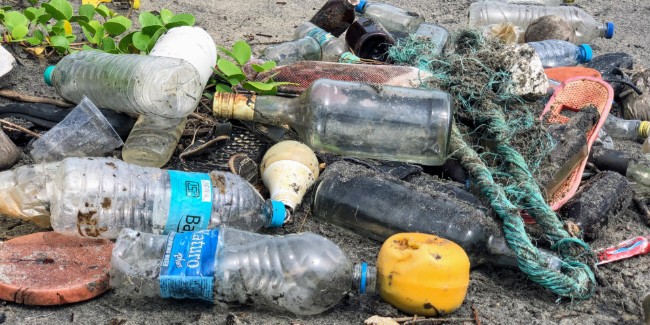National Assembly for Wales Committee calls for urgent action to reduce plastic use and pollution
"Wales cannot waste another day in the battle against plastic pollution. The time to act is now".

This is the conclusion of a report by the National Assembly's Climate Change, Environment and Rural Affairs Committee into the effects of microplastic and plastic pollution. The Committee is calling on the Welsh Government to harness the strength of public demand for change, and to act now by introducing ambitious schemes and legislative changes.
The report sets out a blueprint for a suggested 10 year strategy to reduce plastic use and tackle pollution, warning that Wales cannot wait for others to act.
Interventions suggested in the report include:
- Deposit Return Scheme to encourage the return of materials for reuse or recycling
- Extended Producer Responsibility to ensure that the producer meets the end of life costs arising from their products
- Plastic Packaging Tax as a financial incentive to use recycled plastics instead of virgin materials
"Plastic pollution is one of the greatest challenges facing our planet. We cannot wait any longer, it's important that we step up and take a lead where we can," says Mike Hedges AM, Chair of the Assembly's Climate Change, Environment and Rural Affairs Committee.
"We have seen mass public demonstrations to demand action from governments. People in Wales realise, as we do, that we are in the midst of an environmental crisis. We need change at a systemic level if we are to meet this challenge and we are running out of time."
On 1 May 2019, the National Assembly for Wales became the first parliament in the world to call a Climate Emergency, and environmental issues are now influencing major decisions and policies. Last week, the Welsh Government announced that they were axing the M4 relief road project on the grounds that it would be too damaging to the environment.
Wales has been praised for having the third highest recycling rates in the world and it became the first nation in the UK to introduce a single-use plastic shopping bag charge in 2011.
Whilst the committee commends all the positive steps taken to date, it says that Wales must continue to be ambitious in its environmental responsibilities in order to protect its future.
It urges the Welsh Government to take similar positive actions, and not wait for others to act first.
"We are disappointed that the Welsh Government is not getting to grips with the scale of the problem," adds the committee chair. "We shouldn't wait for others. The public are supportive – we must harness their energy and enthusiasm and bring forward ambitious and transformative policies now."
The Committee heard evidence from a wide range of scientists and environmental groups during the inquiry, including Cardiff University, Marine Conservation Society, Friends of the Earth, Just One Ocean, Eunomia, Dŵr Cymru and University of Plymouth.
(Video: Julian Kirby from Friends of the Earth explains why microplastics are arguably the most dangerous to nature and the food change.)
The inquiry also explored the effects of microplastics on our waterways, seas and soils. During evidence presented by Professor Steve Ormerod, Cardiff University's School of Biosciences, Assembly members were shocked to hear that one in every two insects in the Taff river system already contains microplastics.
Little is known about the effects of this on human health, and the report also suggests that more research should be done into the lasting impact of microplastics entering the food chain.
Further recommendations in the report urge the Welsh Government to consider including other products – such as non-biodegradable wet wipes - for similar legislative intervention as those enforced on microbeads. It also says consideration needs to be given to the microplastics released in daily activities such as washing clothes and the problem of fishing gear being lost at sea, which can have devastating consequences for marine life.
The report sets out 12 recommendations including:
- The Welsh Government should prepare and publish a 10 year, comprehensive and ambitious strategy aimed at reducing plastic pollution. The strategy should be developed with stakeholders and include targets and milestones. It must make clear linkages with other policy areas, such as waste management and 'green' procurement.
- The proposed strategy must ensure that policies to reduce plastic pollution prioritise reduction, then reuse, with recycling as a last resort if these cannot be achieved.
- More research is urgently needed to address knowledge gaps in relation to nano and microplastics in Welsh waters. The Welsh Government should explore how such research can be supported, so that its policy interventions are informed by the latest knowledge.
- The Welsh Government should explore whether legislation can be introduced to restrict access to certain products that contribute to microplastics pollution through the waste water treatment pathways, such as non-biodegradable wet wipes. It should undertake this exploratory work and report back to this Committee within the next 6 months, setting out its initial views on this proposal.
The report will now be considered by the Welsh Government.
Read the full report:
Report on policies and proposals relating to plastic pollution and packaging waste (PDF, 488 KB)

